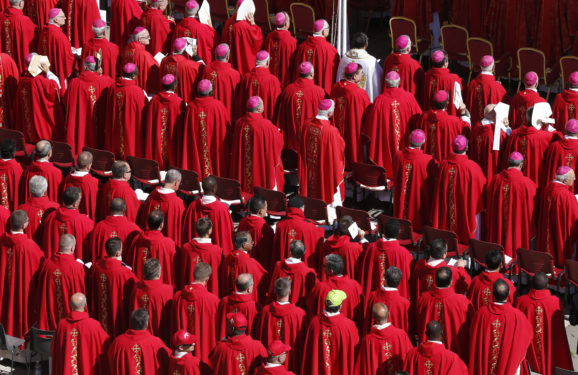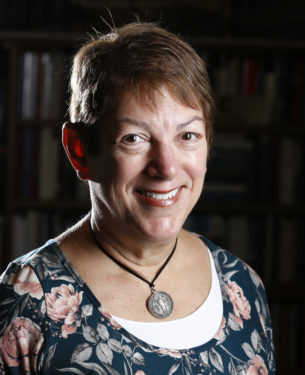By Elise Harris

ROME (Crux) – Teresa Kettelkamp, an expert in the field of child protection and a member of the papal team charged with leading anti-abuse efforts, has said a Feb. 21-24 global summit of bishops addressing the issue will force prelates to accept the problem as a global phenomenon happening on their own turf, and she voiced hope that there will be concrete follow-up.
“I think one of the things the pope wants to emphasize is that every episcopal conference in the world has the responsibility to protect their children,” Kettelkamp said in an interview with Crux, adding that each episcopal conference will be forced to recognize that “that this horrible crime is in their backyard too.”
“Whether they believe it or not, whether they’re in denial or not, whether they want to avoid it or not, it’s there,” she said, stressing that this is a global issue, not a U.S. Church issue, but a universal issue.
Though the individual implementation might be different depending on the country, she said the main principles are the same: putting victims first, education, investigation and accountability.
Kettelkamp, a former head of the U.S. bishops’ Child Protection Office and a member of the Vatican’s Pontifical Commission for the Protection of Minors, spoke the day after the Vatican announced the organizing committee for a Feb. 21-24 summit with the heads of all the world’s bishops’ conferences to address the clerical sexual abuse crisis.
Kettelkamp said she was surprised to learn that Cardinal Sean O’Malley of Boston, Mass., president of the commission for minors, was not part of the four-member organizing committee, however, with vast experience and widely respected for his competency on the issue, she said Cardinal O’Malley’s expertise “would never be overlooked.”
Below are excerpts of Crux’s interview with Kettelkamp:
Crux: In your view, what do the major talking points [at the summit] need to be?
Kettelkamp: It’s everybody’s problem, and I think one of the things the pope wants to emphasize is that every episcopal conference in the world has the responsibility to protect their children, the Church’s children, and you protect your children in so many different ways; education, good formation, good accountability, background checks. But the number one priority is listening to victims and acknowledging that all countries have victims and that our first responsibility is to the person.
Of course the Church is important, but we believe in the sanctity of life, so if we hold to that belief, then the person, the victim, is our first priority, not an institution…But the institution of the Church is a powerful ally in protecting the sanctity of life in that it has the capability to educate, to create a safe environment around the child, to work with parents, to work with communities, to make sure that priests are formed in a way that they will pose no risk to children, they’re background screened. So that’s one, promoting local responsibility.
An umbrella to that is having each episcopal conference realize that this horrible crime is in their backyard too. I think sometimes what conferences are nervous about is they really don’t know how to handle this issue, and that’s why I think education is important. Not just education in the parishes and in the schools, but how do you share with the episcopal conferences around the world how they should do what they should do? They’ve never done this before.
They’ve never taken on this responsibility to protect children, because they’ve denied they’ve even had the problem within the Church.
February is going to be novel in the sense that you will have bishops present from all over the world. But bishops seemed divided during the synod, with some saying it was just a Western problem. Do you think it’s possible for everyone to get on the same page at this point?
Sure. A four-day meeting is not going to change the culture of the Church. I think the four-day meeting is a great start, (and) I love the way the pope finally said, enough is enough. It’s like having a huge staff meeting, enough is enough. We’re going to come together, I’m going to share with you my expectations and what your responsibilities are, and he’s going to tell them what he expects. I think he’s going to tell them his expectations to protect children and to acknowledge that within their conference, they have this issue too.

Whether they believe it or not, whether they’re in denial or not, whether they want to avoid it or not, it’s there, and I think he’s going to tell them that he expects them to be accountable for protecting children.
I don’t know if he’s going to talk about consequences, he’s really a pope of love, so he’s not really one, in my opinion, to carry a heavy stick, but I think he will hold them to the highest degree of accountability.
Do you think this is part of the reason he asked the U.S. bishops to put the brakes on voting on proposals in Baltimore a couple of weeks ago?
Oh yes. It’s a global Church. I’m glad the U.S. bishops are addressing their problems, but we’ve had the charter since 2002, and for me it’s very frustrating that we’ve had this very good charter since 2002 and we still have problems.
First of all, that tells you how deep-seeded this problem is. It’s an evil problem, but I think the pope is saying wait a minute, this is a global issue and I want us all on the same sheet of music. It’s not a U.S. Church, it’s not a Chilean Church, it’s not an Italian Church, it’s a universal Church, and I want us all on the same sheet of music using the same processes.
They may be individualized a bit depending on the culture, but for the main point of addressing this issue, with February right around the corner, he wants them to be clear before they take any definitive action individually.
Would it be helpful for the Church if some universal guidelines were issued?
It would help. It would help those conferences that don’t have guidelines. The pontifical commission has suggested guidelines on our website, so it would be recommended that they take those guidelines and adapt them to what would best suit their conference. Not everything that’s of the Western world is transferable, but the principles are the same..
Those principles don’t change just because it’s a different conference. The processes within those principles might change a little bit, but the principles don’t change. A lot of episcopal conferences don’t have guidelines. There’s 100-112 conferences around the world. I would ask each one individually to adopt guidelines.
The CDF [Congregation for the Doctrine of the Faith] back in 2011 under Cardinal [William] Levada asked for some sort of guidelines, and people have submitted them. How they’ve actualized them, how they’ve implemented them, I don’t know because we haven’t had any accountability, so that’s a big issue too. How do we hold conferences and the bishops accountable for taking what they submitted back in 2011, and putting it into practice?
We used to be a Church that just trusted everyone to do what’s right, but we’ve blown that. It’s not an issue of trust anymore, it’s an issue of verification. So we trust you to do what’s right, but we also verify to make sure you do what’s right, and that’s where we’ve come. … The Church does a lot of good work, excellent work around the world, but that work is weakened if credibility is weakened.
Were you surprised that Cardinal O’Malley was not on the formal organizing committee?
I would say yeah, a little bit, but I also know how involved he is in the issue, so whether he is an official member or not he’ll be very, very involved. He’s got the commission to oversee too, and an archdiocese to run, and his knowledge, they would never not tap him for his input. I just cannot see that happening. I’ve been at meetings with him, and he’s very, very good. He has a long history of dealing with this issue, so his expertise would never be overlooked.
Would you say this meeting has been a long-time coming? Should it have happened a long time ago? And what do you hope for in terms of the next steps that should be taken?
Hopefully, though this isn’t really the Italian way, it’s more of the American way, there will be some sort of timeline and deadlines. So by the end of the year we expect you to have A, B and C done, and that there will be some type of verification process. That could be built into the ad limina visits, when the bishops come to meet with the pope.
We do really need a shift in culture in the Church where we address the victims and acknowledge the victims and help heal the victims. I think that will be one of the pope’s primary purposes too.
May I ask what were some of the suggestions you have already made for February?
I’m a big person on accountability, I’m a big person on verification, I’m real big on victims first. I suggested that they start the conference in February with victim testimony. I think that’s the way you get to the hearts of the bishops. If bishops don’t talk to victims, it’s hard for them to have a change of heart for victims. And who knows? Many of the bishops may be victims themselves.
The victimization numbers are very high as far as ratios. In the U.S. it’s one to four or five girls before the age of 18, and one in six boys have been sexually abused before the age of 18. That’s a huge, huge number of wounded people in our population. I’ve always said that if the statistics were the same but applied to cancer, it would be a national epidemic. We’d have the best minds working on the best solution.
When I talk to priests, I remind them that these are the statistics, so whatever your homily is, you’re talking to the wounded. We are a wounded country as far as being victims of sexual abuse. It’s an evil, it’s a very, very strong evil. And one of the Church’s strongest powers is to fight evil, and we should use the power we have to do that.
